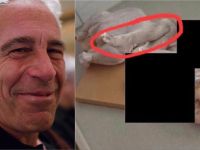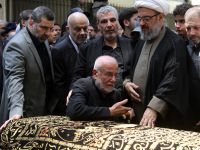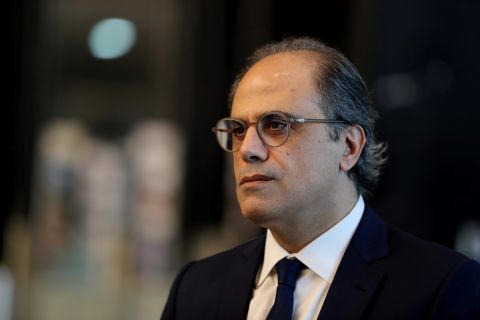By Munir K. Nasser
Washington, DC
Faisal Husseini, Palestinian Minister without Portfolio in charge of the Jerusalem file, said in Washington on Tuesday that there is no possibility of sharing sovereignty over Haram Al-Sharif with Israel.
Husseini, who was speaking at a symposium on Jerusalem, questioned Israeli motives of asking for shared sovereignty over Haram after 33 years of a non-interference policy. He said the Palestinian Authority would maintain the status quo in the Haram area without making any digging or construction of buildings in the compound.
Husseini stressed that the only way to find a solution is to share Jerusalem between Palestinians and Israelis. “All of Jerusalem - east and west - to have two capitals in one open free-access city,” he said.
The senior Palestinian official in Jerusalem emphasized that “for the last 15 centuries, Jerusalem has been the religious, social, economic, and more recently, administrative capital of Palestine.”
“By accepting UN Resolution 242 as the path to the implementation of peace, the borders between the Palestinian and Israeli states in the future must be the borders of June 4, 1967. Without this we cannot find any solution,” he continued.
In a related development, The New York Times revealed on Tuesday that Arafat suggested in his meeting with President Clinton in New York last week that the Jerusalem Committee of the Organization of the Islamic Conference be given sovereignty over Haram al- Sharif. The newspaper quoted senior Clinton Administration officials as saying that Clinton and his advisers thought that Arafat's idea was pretty much a nonstarter.
The paper said Clinton told Arafat what Israel's objections would be. Roughly stated, Clinton explained that if the Israelis could not accept exclusive Palestinian sovereignty, they would not accept the sovereignty of a group of Islamic countries. The essence of the message was that Arafat's solution met his own needs, but not those of the Israelis.
The paper said Clinton interpreted the notion, which they said was only vaguely sketched by Arafat, as an attempt to pass to a group of Arab countries the weighty question of sovereignty over an ancient space that is sacred to Muslims and Jews. The Jerusalem Committee is located in Morocco, and its 16 members include moderate Arab nations, like Egypt and Jordan, as well as Iran, Iraq and Syria.
American officials said that there appeared to be one enticing element of Arafat's presentation to Clinton. Some officials said it showed that Arafat knew he could not get an agreement with the Israelis if he continued to insist on sole Palestinian sovereignty of Haram al- Sharif. It may have been an attempt by Arafat to show Clinton, whom he consistently describes to diplomats as his "friend", that he was trying. But his proposal did not address the sticking point for the Israelis.
The Times also reported that in the moments before meeting with Clinton, Arafat had stalked out of a session in the hotel with the Secretary of State Madeleine Albright, saying he had to consult with his delegation waiting down the hall.
“Arafat's theatrical behavior was interpreted by some officials as a desire on his part to show to his people, and the Muslim world at large, that he was in a struggle to the end on a peace accord,” said the Times.
According to someone in Clinton’s hotel suite, Arafat interrupted the meeting at one point and went over to Albright and smothered her with kisses, apparently to make up for walking out earlier.
Husseini was the keynote speaker at a Washington symposium titled “Towards a Shared
Jerusalem,” sponsored by the American Committee on Jerusalem (ACJ) and the Middle East Institute. The symposium featured Palestinian and American panelists representing educational, religious and academic institutions. It was attended by diplomats, congressional aides, State Department officials, journalists, and human rights and religious groups, and was moderated by journalist Thomas Friedman of the New York Times.
All the panelists at the symposium agreed that Jerusalem must be a shared and open city in order to establish a lasting peace between Palestinians and Israelis. Stephen Cohen President of the Institute for Middle East Peace & Development stressed the need to maintain the status quo which existed before the 1967 war and which regulated the relations between the religious authorities.
“We must end the occupation of Jerusalem, of the old city, of the Haram al-Sharif and affirm the status quo about control of the Haram,” he said.
Fr. Drew Christiansen of the Woodstock Theological Center in Washington told the audience: “When we talk about Christian churches, there is unanimity among them about what is needed.” He stressed the commitment of Christian churches including the Vatican to ensuring that Jerusalem has a special status as a religious city open to all believers.
Geoffrey Aronson of the Foundation for Middle East Peace stressed: “Despite this massive effort of building over 40,000 dwelling units in the course of 30 years, the Palestinian percentage of the city as a whole increased. So, while Israel may have been winning the demographic battle in the eastern side of the city, it is losing it in the city as a whole because Jerusalem is not viewed by most Israelis as an attractive place to live.”
The last panelist, ACJ President Rashid Khalidi, concluded: “Jerusalem will ultimately be shared because there is an enormous desire for peace among the peoples of this single land. Jerusalem will be shared equally between these two peoples because there is no other possibility for a resolution of this conflict. It will ultimately be the capital of both states.” – Albawaba.com
© 2000 Al Bawaba (www.albawaba.com)








